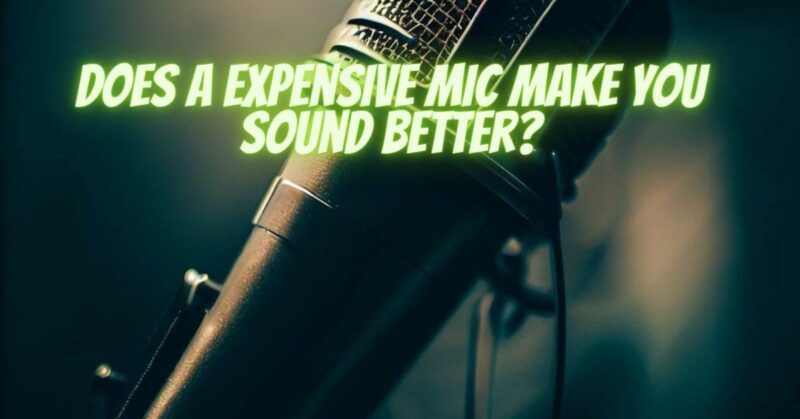When it comes to capturing professional-grade audio, many people wonder whether investing in an expensive microphone can significantly enhance their sound quality. While it’s true that high-quality microphones offer certain advantages, it’s important to understand the broader context and consider various factors that contribute to overall sound improvement. In this article, we delve into the relationship between an expensive microphone and sound quality to help you make an informed decision.
- Enhanced Build Quality and Components:
Expensive microphones often feature superior build quality and use high-grade components. This attention to detail can result in better overall durability, longevity, and reliability. Additionally, higher-quality components can contribute to improved frequency response, reduced self-noise, and enhanced sensitivity, all of which can positively impact sound reproduction.
- Superior Audio Capture:
Expensive microphones are typically designed to capture audio with exceptional accuracy and fidelity. They often possess advanced diaphragm technology, precise polar patterns, and improved transient response, allowing for more detailed and nuanced sound reproduction. This level of precision can be particularly beneficial in professional recording environments where capturing subtle nuances and capturing an accurate representation of the source material is crucial.
- Noise Reduction and Off-Axis Rejection:
High-end microphones often incorporate advanced noise reduction techniques and off-axis rejection capabilities. These features help minimize unwanted background noise, room reflections, and off-axis sound sources, resulting in cleaner recordings and improved sound isolation. This can be especially advantageous in recording studios or environments with challenging acoustic conditions.
- Versatility and Flexibility:
Expensive microphones often offer a wide range of polar patterns, frequency response options, and adjustable settings. This versatility allows for greater flexibility in adapting to different recording scenarios and capturing various sound sources. The ability to tailor the microphone’s characteristics to specific applications can significantly enhance the overall sound quality and ensure optimal performance in diverse recording situations.
- Professional Expectations and Context:
In certain professional contexts, such as commercial music production or broadcasting, the use of high-end microphones is often expected or even required. This is due to the industry’s focus on achieving the highest possible sound quality and meeting specific technical standards. Therefore, investing in an expensive microphone can align with professional expectations and help you meet the desired level of audio excellence.
Conclusion:
While an expensive microphone can provide notable advantages in terms of build quality, audio capture, noise reduction, and versatility, it’s essential to consider the overall recording chain and the specific requirements of your application. Other factors, such as the performance of the recording environment, microphone technique, signal processing, and the quality of other components in the audio chain, also contribute to sound quality. Ultimately, the choice of microphone should be based on a combination of budget, intended use, and personal preference. Remember that even with an expensive microphone, achieving exceptional sound quality requires attention to detail and proper audio engineering techniques throughout the entire recording process.


